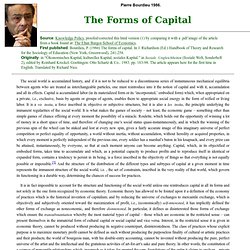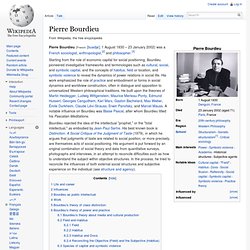

Jackson Pollock's Social Capital. Bourdieu Three Approaches to capital. The Forms of Capital by Pierre Bourdieu 1986. Pierre Bourdieu 1986.

Source: Knowledge Policy, proofed/corrected this html version (1) by comparing it with a .pdf image of the article from a book found at: The Eltan Burgos School of Economics.First published: Bourdieu, P. (1986) The forms of capital. In J. Richardson (Ed.) Handbook of Theory and Research for the Sociology of Education (New York, Greenwood), 241-258.Originally: in “Ökonomisches Kapital, kulturelles Kapital, soziales Kapital.” in Soziale Ungleichheiten (Soziale Welt, Sonderheft 2), edited by Reinhard Kreckel. Goettingen: Otto Schartz & Co.. 1983. pp. 183-98. Pierre Bourdieu. Pierre Bourdieu (French: [buʁdjø]; 1 August 1930 – 23 January 2002) was a French sociologist, anthropologist,[2] and philosopher.[3] Bourdieu rejected the idea of the intellectual "prophet," or the "total intellectual," as embodied by Jean-Paul Sartre.

His best known book is Distinction: A Social Critique of the Judgment of Taste (1979), in which he argues that judgments of taste are related to social position, or more precisely, are themselves acts of social positioning. His argument is put forward by an original combination of social theory and data from quantitative surveys, photographs and interviews, in an attempt to reconcile difficulties such as how to understand the subject within objective structures. In the process, he tried to reconcile the influences of both external social structures and subjective experience on the individual (see structure and agency).